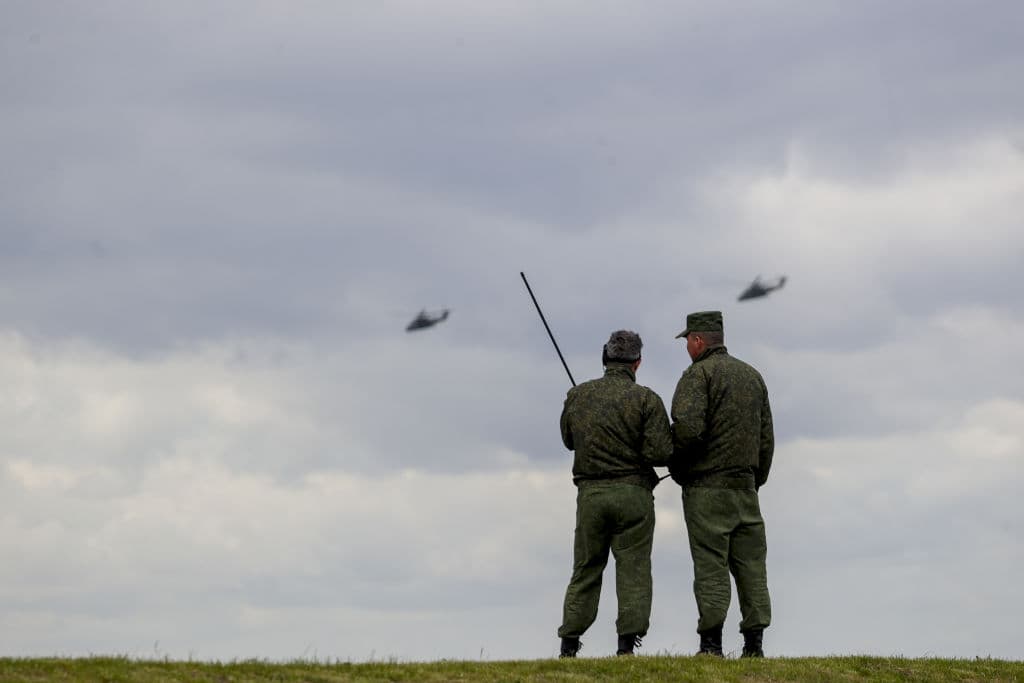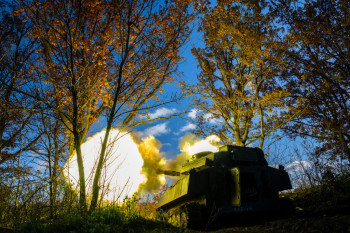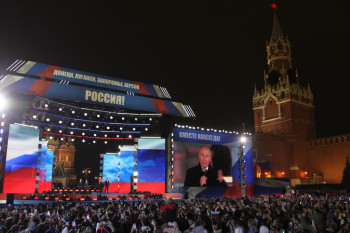Belarus Weekly: Russia deploys ballistic missiles to Belarus

As Belarusians mourn The Night of the Executed Poets, the climax of the Stalinist repressions against intellectuals, state-sponsored repressions continue almost a century later.
Moscow deploys ballistic missiles to Belarus, and Minsk opens two military command centers to train Russian troops as part of the countries’ joint military command force.
Belarusian doctor exposes Minsk’s role in providing medical care for Russian troops.
Belarus’ unemployment rate skyrockets in contrast to official statistics from the Belarusian government.
Small businesses across Belarus cease operations amid confusion over price regulation measures imposed by the regime of Belarusian dictator Alexander Lukashenko.
Russia deploys ballistic missiles to Belarus
According to the U.K. Defense Ministry, Russia deployed two MiG-31K supersonic interceptor aircraft to Belarus’ Machulishchy Airfield on Oct. 17. The jets are likely capable of carrying Kinzhal air-launched ballistic missiles.
While the Kinzhal air-launched ballistic missiles have a range of 200 km, British intelligence suggests that basing them in Belarus gives Russia little added advantage in its full-scale war against Ukraine.
Instead, the move may be intended to “portray Belarus as increasingly complicit in the war.”
Belarusian monitoring group Belarusian Hajun said it observed three Russian Mikoyan MiG-31K jets arriving in Belarus alongside three Ilyushin IL-76 aircraft on Oct. 16.
Belarus, Russia create military centers for joint training
On Oct. 31, Lukashenko signed a decree approving the creation of training and combat centers for military personnel from Belarus and Russia.
The agreement on combat training centers was initiated in 2021 and envisioned opening two training centers in Russia and one in Belarus.
As of Oct. 10, the joint military command is being deployed in Belarus. Reportedly, up to 9,000 Russian troops will arrive in Belarus. Local media have reported that Belarusian instructors have been training mobilized Russian soldiers at the Asipovichy Artillery Range and the 230th Combined Arms Range near Baranavichy.
Although there’s no evidence of imminent attack from Belarus, Kyiv is increasing its forces on the border with Belarus, said Oleksiy Hromov, deputy head of Ukrainian General Staff.
Belarusian doctors expose the scale of losses among Russian troops
In a CNN report published on Oct. 26, an exiled Belarusian medic provided proof of the number of losses the Russian army suffered in an attempt to sack Kyiv at the beginning of Russia’s full-scale invasion.
The medic also exposed the use of Belarusian infrastructure by the Russian military.
The doctor from Mazyr, a town in southern Belarus that stationed Russian troops, fled the country and has managed to smuggle out medical documents of Russian patients.
He reports that on the morning of Feb. 24, medical personnel were instructed to free up 250 beds, send Belarusian patients home and prepare to receive Russian soldiers.
The biggest daily number of casualties – over 100 soldiers – arrived at the Mazyr hospital on Feb. 28. Throughout the beginning of March, the hospital has been welcoming up to 40-50 soldiers daily.
Medical personnel was pressured to sign non-disclosure agreements and informed that the Russian FSB controls the premises. The injured and even dead soldiers were admitted at night to hide them from the public eye in Belarus.
Mazyr hospital was just one of the medical facilities used by the Russian army.
Belarus provided Russia with field hospitals in the villages of Veliky Bokov and Naroulya, a hospital in Mazyr, and several hospitals in Homiel.
The latter was admitting soldiers stationed near the radioactive Chornobyl Nuclear Power Plant.
Small businesses go on strike over price regulation measures
On Oct. 27, business owners across 13 cities and towns in Belarus declined to open amid price regulations imposed by Lukashenko’s regime.
The Belarusian government introduced price regulations on Oct. 19 for 370 goods, including food, clothing, and cars.
Some business owners that ceased operations were reportedly afraid of punishment given the ambiguity of price regulations.
For example, Belarusian authorities sentenced Tatsiana Shastak, an entrepreneur from Polatsk, to a 30-day arrest on Oct. 26 for presenting local authorities with a petition demanding clarifications over the price regulation measures.
On Oct. 6, Lukashenko announced a ban on price increases for consumer goods in Belarus due to “exorbitant” inflation. By Oct. 10, Belarusian authorities launched over 10 criminal cases against those who violated the order.
Lukashenko claimed on Oct. 10 that the ban is temporary until more permanent means to regulate prices are determined. He did not mention those against whom criminal cases have been filed for violating the order.
Some experts suggest this measure is an attempt by Lukashenko’s regime to maintain the illusion of stability and control in Belarus.
Belarus’ official unemployment is 0.1%, real numbers at least 30 times higher
Belarus’ national statistics portal Belstat reported that there are 180,100 unemployed people in the country, which is 30 times more than Belarus’ Labor Ministry reported.
From January to September, Belarus’ unemployment rate stood at 3.6%, according to the International Labor Organization (ILO). This is a sharp contrast to the 0.1% reported by Belarus’ Labor Ministry.
Over 50,000 Belarusian workers have also migrated from the country in the past nine months.
Belarusian authorities detain political prisoners serving house arrest
Belarusian authorities detained and interrogated political prisoners serving house arrest at 12 correctional facilities across Belarus on Oct. 31.
Of those detained, at least 10 political prisoners are now held at pre-trial detention centers facing additional criminal charges.
The mass detention and arrest of Belarusian civil society have continued in Belarus.
On Oct. 26, Belarusian journalist Siarhei Satsuk, who has extensively investigated corruption in Belarus, was sentenced to eight years in prison.
Former Belstat journalist Ales Liubianchuk was sentenced to three years in prison on Oct. 27. He was convicted of allegedly having “created and participated in an extremist group.”












